 Petzlover
Petzlover Bergamasco is originated from Italy but Gull Dong is originated from Pakistan. Bergamasco may grow 44 cm / 17 inches shorter than Gull Dong. Bergamasco may weigh 25 kg / 55 pounds lesser than Gull Dong. Bergamasco may live 3 years more than Gull Dong. Both Bergamasco and Gull Dong has almost same litter size. Bergamasco requires Moderate Maintenance. But Gull Dong requires Low Maintenance
Bergamasco is originated from Italy but Gull Dong is originated from Pakistan. Bergamasco may grow 44 cm / 17 inches shorter than Gull Dong. Bergamasco may weigh 25 kg / 55 pounds lesser than Gull Dong. Bergamasco may live 3 years more than Gull Dong. Both Bergamasco and Gull Dong has almost same litter size. Bergamasco requires Moderate Maintenance. But Gull Dong requires Low Maintenance
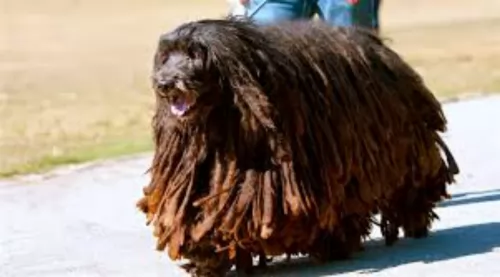 The Bergamasco comes from northern Italy. This medium sized sheepdog is of ancient origin. Known as an Italian sheep herding breed, his name actually comes from the town where he comes from - Bergamo.
The Bergamasco comes from northern Italy. This medium sized sheepdog is of ancient origin. Known as an Italian sheep herding breed, his name actually comes from the town where he comes from - Bergamo.
It was after World War II that there was danger that this breed would disappear as the need for herding and shepherding was diminishing. An Italian breeder, however, Dr. Maria Andreoli, stepped in to save the breed.
It was in 2015 that the American Kennel Club also changed the breed’s status from Miscellaneous to the Herding Group.
 The Gull Dong dog is thought to come from British Colonial India during the 1900's. The area later became known as Pakistan, and this is where the dog originated from.
The Gull Dong dog is thought to come from British Colonial India during the 1900's. The area later became known as Pakistan, and this is where the dog originated from.
Known also as the Bully Gull Terr, the dog came about by crossing Bully Kutta (Pakistani Mastiff) with a pure bred Gull Terr. The breeders wanted a dog that had the best features and characteristics of both the 2 dog breeds.
They were looking for particular characteristics such as size, strength and speed. This is a rare dog breed and he isn’t associated with any kennels or clubs, so not many records have been kept regarding their origin and development.
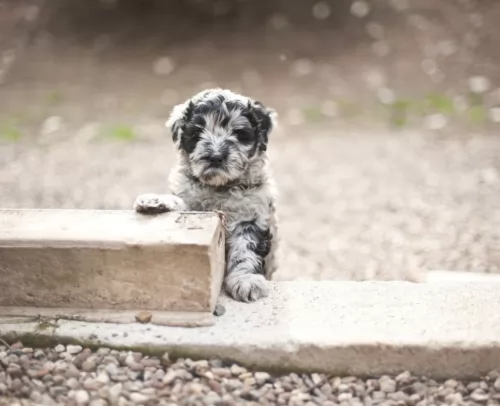 This medium sized sheepdog stands 54 – 62cm in height and weighs up to 38 kg as an adult. It is his coat which draws the most attention. It is of a coarse texture and actually greasy to the touch. It actually forms into strands or almost like dreadlocks from the top of the body, so that people agree he is one of shaggiest dog breeds there are.
This medium sized sheepdog stands 54 – 62cm in height and weighs up to 38 kg as an adult. It is his coat which draws the most attention. It is of a coarse texture and actually greasy to the touch. It actually forms into strands or almost like dreadlocks from the top of the body, so that people agree he is one of shaggiest dog breeds there are.
From age 1 on the coat starts to become woolly, and then the flocks start to form. As these clumps of hair appear, it will become necessary to separate them into smaller cords by hand to ensure attractive formation Brushing isn’t necessary but a big toothed comb can keep their hair ‘groomed’.
The colour of the coat is solid grey with patches of shades of grey and sometimes black. His dense, heavy coat makes it that he is suited to cooler climates. Because he is a herding dog, he wouldn’t do well in an apartment but would suit a home with a large garden.
He is intelligent and social but will need firm handling as he is a boisterous dog. He has a muscular yet compact body with a large head, long tail, high-set semi-drooping ears and large, gentle looking brown eyes. Although not instinctively aggressive, he makes an excellent watch dog with strong protective instincts to protect his human family.
He views new people into his circle with suspicion and wariness. He is good with kids and pets in the home and is playful and energetic.
 The deep chested Gull Dong is a large dog and stands at 76 – 106cm in height and weighs in the region of 40 – 63kg.
The deep chested Gull Dong is a large dog and stands at 76 – 106cm in height and weighs in the region of 40 – 63kg.
He has a short, smooth coat in various colors such as white, grey, black, brindle or bi-color such as white with black spots. He is a muscular, powerful breed dog and his ears are mostly cropped, but when left they are short and floppy. His tail can be docked but these days it tends to be left long. He has a huge head, and similar to bulldogs, this mastiff dog has loose skin around the jaw and neck.
This is a strong-willed dog who is also intelligent. Just his sheer size will require that you have him trained and socialized. It is actually important to train and discipline this dog as he is strong willed. He is intelligent and learns easily.
After training, he will require a strong, firm and consistent owner. He is fairly suspicious of strangers and won't take kindly to anyone who tries to come onto his properly. He is a dominant, aggressive dog and while he is a loyal, loving pet with his human family, he isn't an ideal dog to have with small children in the home.
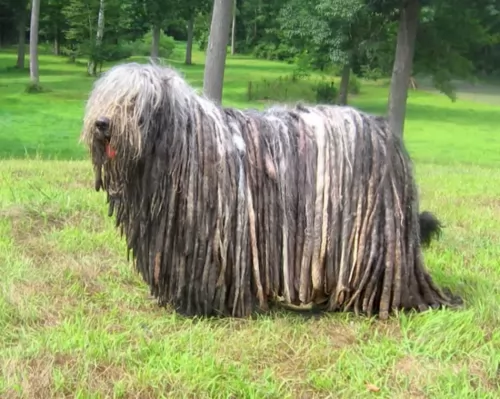 This is a working dog so they are naturally alert. He is also intelligent and independent and this independence is seen with training as he doesn’t take easily to following instructions, becoming stubborn. You’ll certainly want to have your Bergamasco socialized and trained as he can be a boisterous dog, bounding with energy.
This is a working dog so they are naturally alert. He is also intelligent and independent and this independence is seen with training as he doesn’t take easily to following instructions, becoming stubborn. You’ll certainly want to have your Bergamasco socialized and trained as he can be a boisterous dog, bounding with energy.
This is a dog that will need to be kept busy and provided with plenty of activities so that he remains happy, playful and relaxed.
Lively and intelligent, these dogs also form strong bonds with their owners and get on well with the children in the home. He will take well to country life as opposed to living in the city.
 This is a powerful, intelligent dog and with training and socialization he is capable of becoming a loving, protective pet who listens to you.
This is a powerful, intelligent dog and with training and socialization he is capable of becoming a loving, protective pet who listens to you.
He does tend to be aggressive and therefore people who are buying a dog for the first time might battle with the characteristics of this dog. He will certainly need a firm, strong, patient owner. He isn't the wisest choice for when you've got small children in the house, though well trained dogs and children are able to get along well together.
When your heavy, muscular Gull Dong is handled in a firm, kind manner, he is well exercised and fed and treated firmly and kindly, he is able to make a great, loyal companion.
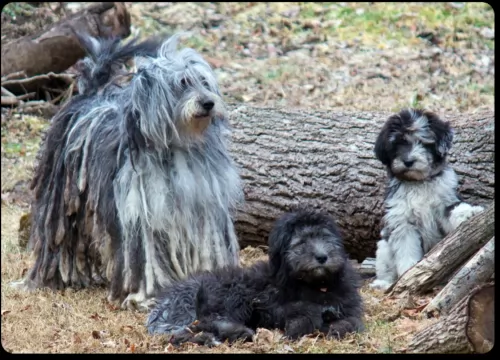 Your Bergamasco can live to be 13 to 15 years of age and he is considered to be a healthy breed. Nonetheless you want to be aware of health issues that are common to this breed
Your Bergamasco can live to be 13 to 15 years of age and he is considered to be a healthy breed. Nonetheless you want to be aware of health issues that are common to this breed
he is vulnerable to heat. He can die of heat exhaustion quicker than other breeds
keep an eye on him for hip dysplasia, progressive retinal atrophy and skin allergies
 The Gull is a fairly healthy dog, and with good care he can reach 10, 11 or 12 years of age.
The Gull is a fairly healthy dog, and with good care he can reach 10, 11 or 12 years of age.
If you choose to own a white one, you will know that he is susceptible to deafness and skin problems. White coated dogs battle with deafness, and the reason for this is that they carry the piebald gene. The piebald gene is a result of the absence of melanocytes – those cells which create pigment.
The ability to hear comes from a layer of cells within the inner ear which come from the same stem cell source. Without this stem cell, the dog isn't able to make this specialized layer of hearing cells.
With hip dysplasia, the head of the thigh bone doesn’t fit properly into the hip socket, resulting in the bone wearing away and arthritis settling in. Your dog can experience pain and stiffness and he can become lame. You'll notice he is no longer enthusiastic to join in with games and exercise.
Hip dysplasia can be managed with medication while some dog owners, if they can afford it, turn to surgery which can be very costly.
He is a deep chested dog and this means you need to be aware of the risks associated with bloat, an emergency gastrointestinal syndrome which can be life threatening and where your dogs stomach becomes hard and bloated.
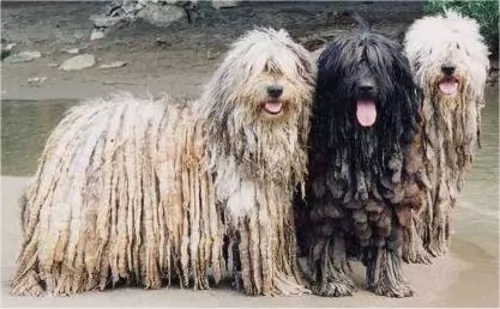 The Bergamasco isn’t a shedder but his coat will need to be combed once a week just to keep it in order. You don’t want to bath him too often, especially during the Winter as his coat takes a long time to dry. It isn’t recommended to shave a Bergamasco as the coat regulates the dogs temperature – keeping him warm and cold as the weather demands.
The Bergamasco isn’t a shedder but his coat will need to be combed once a week just to keep it in order. You don’t want to bath him too often, especially during the Winter as his coat takes a long time to dry. It isn’t recommended to shave a Bergamasco as the coat regulates the dogs temperature – keeping him warm and cold as the weather demands.
They thrive on a blend of kibble (dry) mixed with raw and-or moist food once or twice a day. Remember to include quality chicken, turkey, etc. mixed with some vegetables and rice into your dog’s diet. Ensure a constant supply of fresh water in an easily-cleanable bowl.
Balls and ropes are important for building muscle strength and burning energy. Remember your Bergamasco is a working breed and will need plenty of games and exercise.
 Plenty of room to run around in is important for the Gull Dong as he is a working breed who is used to having a job to do. You will certainly need to take him on walks or play rope- and ball games with him.
Plenty of room to run around in is important for the Gull Dong as he is a working breed who is used to having a job to do. You will certainly need to take him on walks or play rope- and ball games with him.
The Gull will require brushing twice a week as he is a short haired dog and an average shedder.
This is a large energetic dog and you will need to feed him a high quality food specially for large, energetic dogs. He needs his full quota of minerals and vitamins in his food. Provide him with homemade food such as cooked chicken, rice and vegetables and some raw meat from time to time. Never leave him without a constant supply of fresh, cool drinking water.